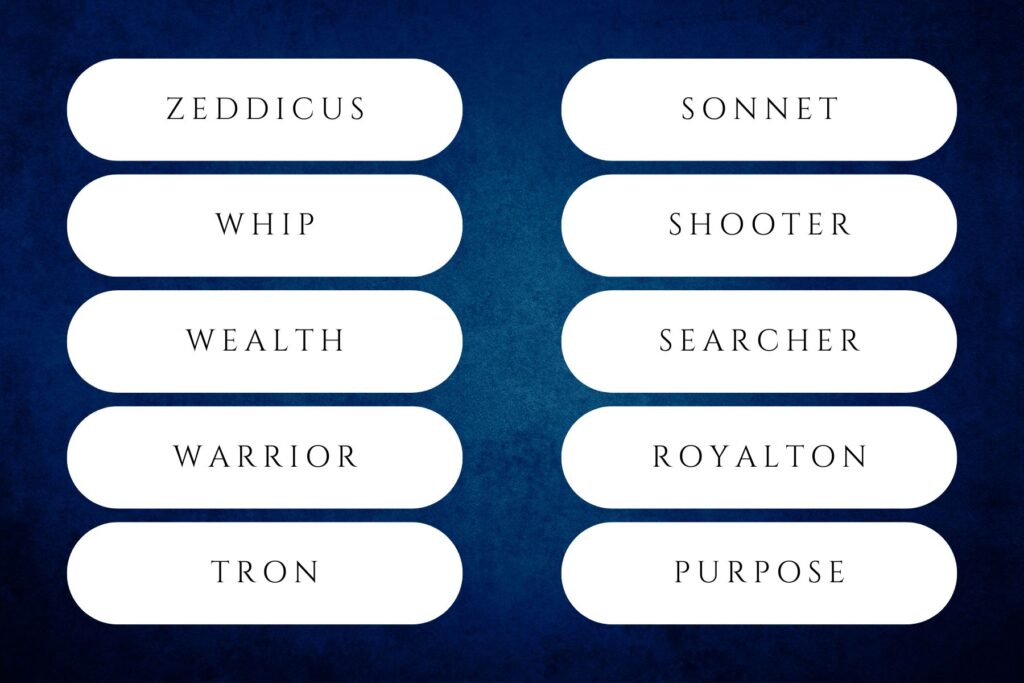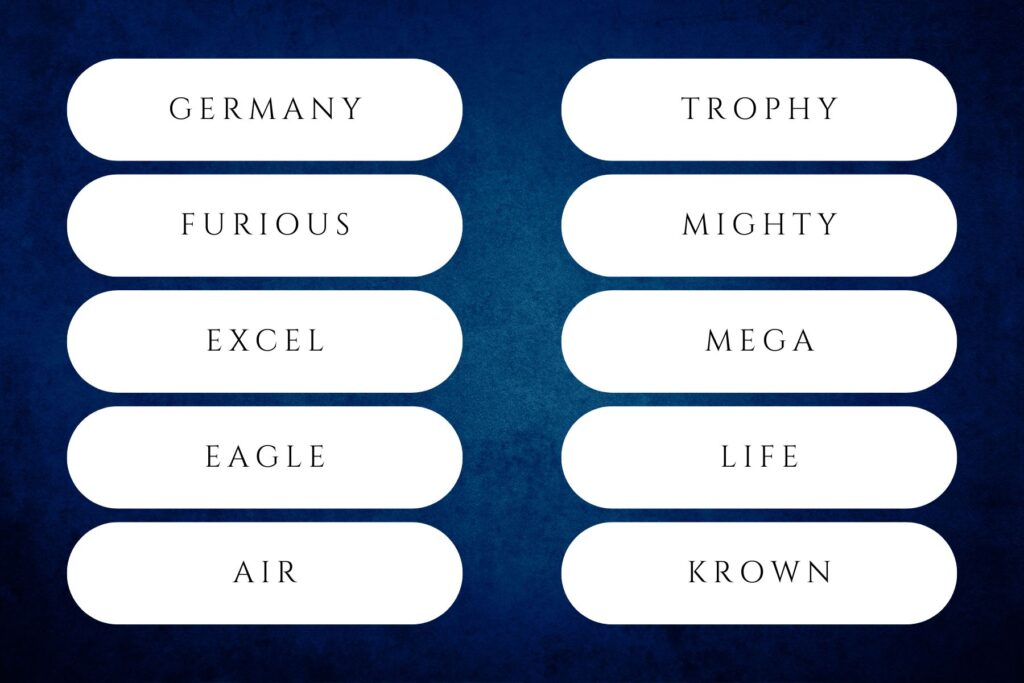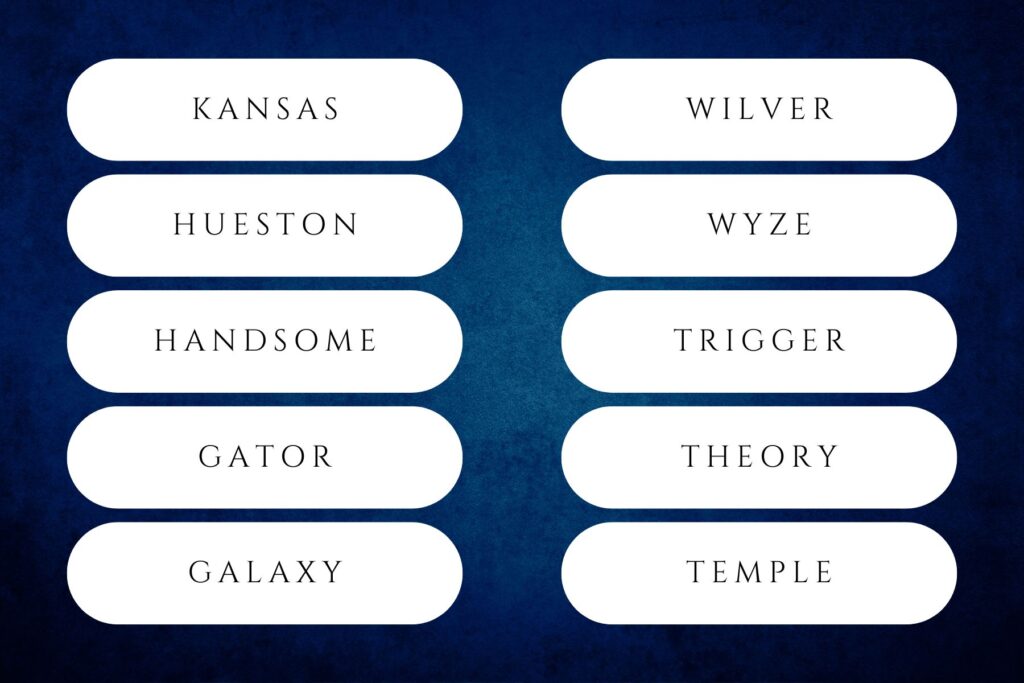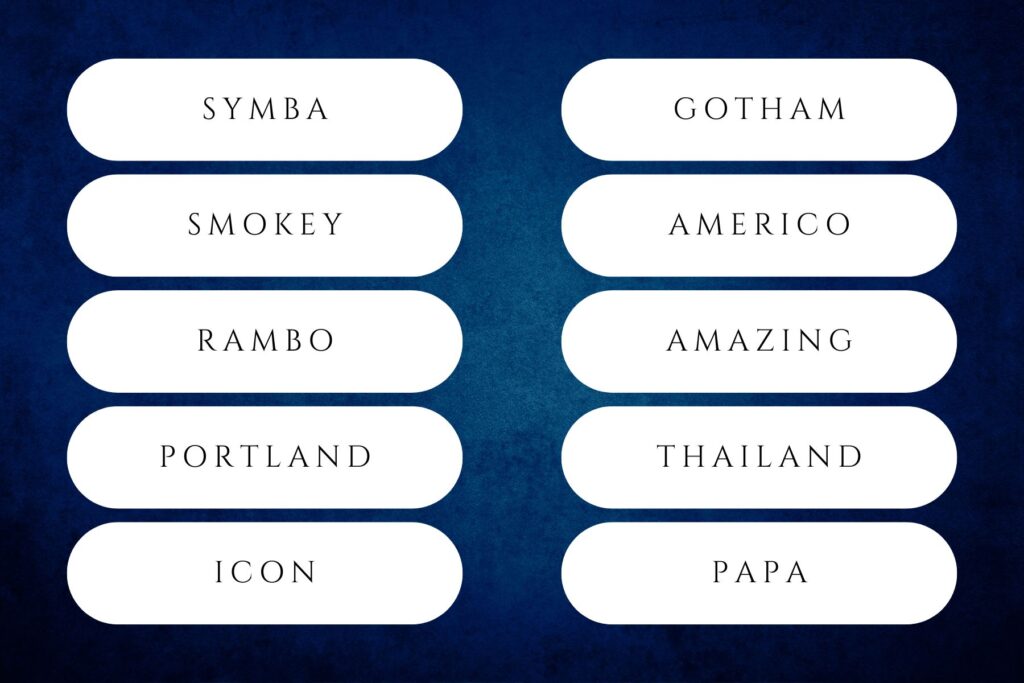“Nobody talks about how freaking hard it is to name a baby."
You might not believe these rare boy names are real — but they are (or at least were in 2024).
Every year, the Social Security Administration (SSA) releases baby name data for the previous year, including the most popular names and the ones that saw the biggest decrease in popularity.
But they also release a massive annual list of every name given to at least five baby boys that year.
RELATED: The Fastest-Rising Baby Names of 2024
As you can imagine, some of the rare baby names on that list are more unique than others, making it the perfect source of inspiration for parents who are looking for that one-of-a-kind type of name.
For example, we’ve all heard of Daniel, but what about Tanielu, Yaniel, Janiel, Ethaniel or Haniel?
Each of those rare names were given to no more than 28 baby boys last year. And the same goes for Kodiak, Lyrik, Midas, Million, Chief, Noctis, Rufus, Priest, Ruckus, Pope, Nirvana, Success and Spurgeon.
It’s true that you never really know what you’re going to get when browsing through the SSA’s extensive data on baby names, so let’s take a closer look at some of the most unexpected baby names from 2024.

50. Zeddicus
Origin: Latin; Hebrew
Meaning: God is righteousness; God’s justice
Zeddicus, pronounced ZED-ih-kiss, is believed to be a Latin spin on the name Zedekiah, which comes from the Hebrew name Tsiḏqiyyahu and is composed of the Hebrew elements tseḏeq, meaning “justice,” and yah, meaning “God.”
49. Whip
Origin: English
Meaning: Fast; Piece of leather
Whip, pronounced WIP, comes directly from the English word whip (derived from wippen), meaning “to move fast or suddenly in a specified direction” or referring to a piece of leather or rope that is fastened to a stick.
48. Wealth
Origin: English
Meaning: Happiness; Prosperity; Abundance
Wealth, pronounced WELTH, comes directly from the English word wealth, derived from the Old English word welth, referring to a “state or condition of happiness” or referring to prosperity in abundance.
47. Warrior
Origin: English; French
Meaning: Soldier; Combatant
Warrior, pronounced WOHR-ee-er, comes directly from the English word warrior, referring to a soldier, combatant or man engaged in warfare. The word ultimately derives from the Old French word guerroieor.
46. Tron
Origin: English
Meaning: Subatomic particle; Sci-fi franchise
Tron, pronounced TRON, comes directly from the English suffix -tron, which is usually used to denote a subatomic particle or particle accelerator. It’s also the name of a sci-fi franchise that debuted in 1982.
45. Sonnet
Origin: English; French; Italian
Meaning: Song; 14-line poem
Sonnet, pronounced SAH-nit, comes directly from the English and French word sonnet, derived from the Italian word sonetto, which refers to a song or 14-line poem with a specific structure and rhyme scheme.
44. Shooter
Origin: English
Meaning: One who shoots
Shooter, pronounced SHOO-ter, comes directly from the English word shooter, derived from Midle English shetere and sceotere, referring to someone who shoots something, such as an arrow or other weapon.
43. Searcher
Origin: English
Meaning: Inquisitor; To seek something
Searcher, pronounced SIR-cher, comes directly from the English word search and refers to someone who hopes to find something by looking or otherwise seeking carefully and thoroughly for something special.
42. Royalton
Origin: English
Meaning: Royal settlement; Royal town
Royalton, pronounced ROY-uhl-tun, is a combination of the English word royal (from Old French roial and Latin regalis), meaning “fit for a king” or “kingly,” and the Old English suffix tun, meaning “settlement.”
41. Purpose
Origin: English; French
Meaning: Intention; Aim; Goal
Purpose, pronounced PUR-puss or PUR-piss, comes from the English word purpose (derived from Old English purpus and Old French porpos), meaning “the reason for which something is done or created.”

40. Pressure
Origin: English
Meaning: To press; Persuade; To exert force
Pressure, pronounced PREH-shur, comes directly from the English word pressure (derived from Old French presseure and Latin pressura), meaning “continuous physical force” or “use of persuasion.”
39. Pope
Origin: English; Latin; Greek
Meaning: Bishop; Head of the Catholic Church
Pope, pronounced POHP, comes directly from the English word for the Bishop of Rome as head of the Roman Catholic Church. The word ultimately derives from Church Latin papa and Greek papas, meaning “bishop.”
38. Pluto
Origin: English; Latin; Greek
Meaning: Wealth; God of underworld; Dwarf planet
Pluto, pronounced PLOO-toh, is the Latinized form of the Greek name Plouton, which comes from the Greek word ploutos, meaning “wealth.” In Greek mythology, Pluto (Hades) was the god of the underworld. It’s also the name of a dwarf planet.
37. Olaf
Origin: Old Norse
Meaning: Ancestor’s inheritance; Ancestor’s legacy
Olaf, pronounced oh-LAWF, comes from the Old Norse name Áleifr and is composed of the Old Norse elements anu, meaning “ancestor,” and leif, meaning “inheritance” or “legacy.” It was popularized by the Disney franchise “Frozen.”
36. Notorious
Origin: English; Latin
Meaning: Well-known; Often spoken of; Famous
Notorious, pronounced noh-TOR-ee-us, comes directly from the English word notorious (derived from Latin notorius), meaning “publicly known” or “often spoken of.” It ultimately comes from the Latin word notus, meaning “known.”
35. Kourage
Origin: Modern; English
Meaning: Brave; Strong; Vigor
Kourage, pronounced KUR-ihj, is a variant of Courage, which comes directly from the English word courage (derived from Old French corage), referring to the ability to do something that frightens one.
34. Jaguar
Origin: English; Tupi
Meaning: Large spotted cat; Luxury car brand
Jaguar, pronounced JEH-gwar, comes directly from the English word jaguar (derived from Tupi jaguara), referring to the large spotted cat of the Americas (Felis onca). It’s also a popular luxury vehicle brand.
33. Infinity
Origin: English; Old French; Latin
Meaning: Boundlessness; Infinite time; Never-ending
Infinity, pronounced in-FIN-ih-tee, comes directly from the English word infinity (derived from Old French infinité and Latin infinitatem), meaning “boundlessness” or “a number greater than any quantity or number.”
32. Hershey
Origin: English
Meaning: From Hercé; Town in Pennsylvania; Chocolate
Hershey, pronounced HUR-shee, originated as a surname given to someone who was born or lived in Hercé in Normandy. It was popularized in the United States by the town of Hershey, PA and the chocolate company.
31. Goodness
Origin: English
Meaning: Morally good; Virtuous; Nutritious
Goodness, pronounced GUD-niss, comes directly from the English word goodness (derived from Old English godnes), meaning “the quality of being morally good or virtuous” or “nourishing element of food.”

30. Germany
Origin: English; Latin
Meaning: European country
Germany, pronounced JUR-muh-nee, comes directly from the name of the country, which derived from the Latin term Germania and is often credited to Julius Ceasar, who called the areas east of the Rhine and north of the Danube as Germania.
29. Furious
Origin: English; French; Latin
Meaning: Extremely angry; Rage
Furious, pronounced FYER-ee-us, comes directly from the English word furious (derived from Old French furieus and Latin furiosus), meaning “extremely angry.” The Latin word furia means “rage” or “passion.”
28. Excel
Origin: English; Latin
Meaning: Exceptionally good; Proficient; Spreadsheet
Excel, pronounced EX-cell, comes directly from the English word excel (derived from the Latin word excellere), which means “to be exceptionally good at or proficient in an activity or subject.” Excel can also refer to Microsoft Excel, a spreadsheet program.
27. Eagle
Origin: English; Old French; Latin
Meaning: Large bird; Golf score
Eagle, pronounced EE-guhl, comes directly from the English word eagle, (derived from Old French egle and Latin aquilus), referring to the large bird of the genus Aquila. Arnold is another name that means “eagle.”
26. Air
Origin: English; Latin; Greek
Meaning: Invisible gas; Atmosphere
Air, pronounced AIR, comes directly from the English word air (derived from the Latin word aer and Greek word aēr), referring to the invisible gaseous substance that surrounds Earth, like oxygen and nitrogen.
25. Trophy
Origin: English; Latin; Greek
Meaning: Award; Prize; Winner
Trophy, pronounced TROH-fee, comes directly from the English word trophy (from Latin trophaeum and Greek tropaion), meaning “award” or “prize.” The Greek word tropaios translates to “defeat” or “rout.”
24. Mighty
Origin: Old English
Meaning: Great strength; Impressive power
Mighty, pronounced MY-tee, comes directly from the English word mighty (derived from Old English mihtig and mæhtig), meaning “possessing great and impressive power or strength, especially on account of size.”
23. Mega
Origin: English; Sanskrit
Meaning: Cloud; Large; Great
Mega, pronounced MEH-guh, could derive from the Sanskrit word megha, meaning “cloud,” but also comes directly from the English prefix mega, meaning “large,” “great” or “unit taken a million times.”
22. Life
Origin: English
Meaning: Existence; Living; Alive
Life, pronounced LYFE, comes directly from the English word life (derived from Old English lif), referring to the existence of an individual human being or animal. The name was given to six baby boys in 2024.
21. Krown
Origin: English; French; Latin
Meaning: Ornamental headdress
Krown, pronounced KROWN, is a variant of Crown, which comes directly from the English word crown (derived from Old French corone and Latin corona), meaning “a circular ornamental headdress worn by a monarch.”

20. Kansas
Origin: English; American
Meaning: American state; Kansa tribe
Kansas, pronounced KAN-siss, comes directly from the English name of the American state located in the Midwest. Kansas gets its name from the Kansa or Kaw tribe, a Native American tribe who lived in the area.
19. Hueston
Origin: English; Scottish
Meaning: Hugh’s town; City in Texas
Hueston, pronounced HEW-stin, is a modern variant spelling of Houston, referring to the city in Texas. The name is believed to mean “Hugh’s town” in Scottish and originated as a place name near Glasgow.
18. Handsome
Origin: English
Meaning: Attractive; Good looking; Substantial; Easy to handle
Handsome, pronounced HAN-sum, comes directly from the English word handsome (derived from Old English handsom), meaning “easy to handle,” “attractive” or “good looking,” and “substantial.”
17. Gator
Origin: English; Spanish; Latin
Meaning: Alligator; Lizard-like reptile
Gator, pronounced GAY-ter, is a shortened form of the English word alligator (derived from Spanish el lagarto and Latin lacertus), referring to the large, carnivorous, lizard-like reptile of the Americas.
16. Galaxy
Origin: English; Latin; Greek
Meaning: System of stars held together by gravity
Galaxy, pronounced GAL-uhx-ee, comes directly from the English word galaxy (derived from Latin and Greek galaxias), referring to a system of millions or billions of stars held together by gravitational attraction.
15. Wilver
Origin: English
Meaning: Wild boar; Precious metal
Wilver, pronounced WIL-vur, is likely a variant of Wilbur, meaning “wild boar” in Middle English, but can also be a unique variant of Silver, which comes from the English word for the shiny precious metal.
14. Wyze
Origin: English
Meaning: Smart; Knowledgeable; Good judgment
Wyze, pronounced WYZE, is a variant spelling of Wise, which comes directly from the English word wise (derived from Old English wis), meaning “to have or show experience, knowledge, and good judgment.”
13. Trigger
Origin: English; Old Norse
Meaning: Trustworthy; Precipitate; Lever on gun
Trigger, pronounced TRIH-gur, comes from the Old Norse word tryggr, meaning “trustworthy.” It also coincides with the English word meaning “to cause something to happen” or the release point of a gun.
12. Theory
Origin: English; Latin; Greek
Meaning: System of ideas; Principles; Explanation
Theory, pronounced THEE-ohr-ee or THEER-ee, comes directly from the English word theory (derived from Latin and Greek theoria), referring to a system of ideas or principles intended to explain something.
11. Temple
Origin: English; Latin
Meaning: Building of worship; Flat area on side of head
Temple, pronounced TEM-puhl, originated as a surname derived from the Latin word templum, referring to a “building for worship of a god.” It also refers to the flat area on each side of your head by your ear.

10. Symba
Origin: Shona; Swahili
Meaning: Power; Strength; Lion
Symba, pronounced SIM-buh, is a variant spelling of Simba, which can translate to “power” or “strength” in Shona or “lion” in Swahili. The name was popularized by the main character in “The Lion King” franchise.
9. Smokey
Origin: English
Meaning: Filled with smoke; Smelling of smoke
Smokey, pronounced SMOH-kee, comes directly from the English word smoky, meaning “filled with or smelling of smoke.” The name was popularized by Smokey Bear, the mascot for the U.S. Forest Service’s Wildfire Prevention Campaign.
8. Rambo
Origin: Norwegian; Swedish; Fictional
Meaning: Raven dweller; Resilience
Rambo, pronounced RAM-boh, is composed of the Norwegian and Swedish elements ramn, meaning “raven,” and bo, meaning “home” or “dweller.” It was popularized by Sylvester Stallone’s character in the “Rambo” franchise.
7. Portland
Origin: Old English
Meaning: Land by the port; Land surrounding the water
Portland, pronounced PORT-lind, translates to “land surrounding the water” or “land by the port” in Old English. It’s inspired by the cities Portland, OR and Portland, ME, which are named after the Isles of Portland in England.
6. Icon
Origin: English; Latin; Greek
Meaning: Widely admired
Icon, pronounced EYE-kon, derives from the Latin word icon, which comes from the Greek word eikon, meaning “image in a mirror.” In English, an icon refers to a person or thing widely admired for their influence.
5. Gotham
Origin: Old English
Meaning: New York City; Home of the goat
Gotham, pronounced GAH-thum, was first used as a name for New York City by Washington Irving in "Salmagundi" (1807). Other theories suggest it comes from the Old English elements gat, meaning “goat,” and ham, meaning “homestead,” or hamm, meaning “water meadow.”
4. Americo
Origin: Portuguese; Spanish
Meaning: America; Home ruler
Americo, pronounced uh-MAIR-ih-koh, could be a variant of America, but could also be the Portuguese and Spanish form of Amerigo, which is the Italian form of Emmerich, meaning “home ruler.”
3. Amazing
Origin: English
Meaning: Astonishing; Causing great surprise
Amazing, pronounced uh-MAY-zing, comes directly from the English word amazing (from Middle English amased), meaning “astonishing” or “causing great surprise or wonder.” It was given to seven boys and 12 girls in 2024.
2. Thailand
Origin: Thai
Meaning: Land of the free
Thailand, pronounced TYE-land, comes from the name of the country in Southeast Asia, which is locally known as Prathet Thai.” The word thai means “free,” therefore Thailand means “land of the free.”
1. Papa
Origin: Italian; Maori; English
Meaning: Earth; Father; Pope
Papa, pronounced PAH-puh, could refer to the Maori word meaning “earth,” but is also a common name for “father” or “pope” in Italian. Believe it or not, it was given to 11 baby boys in 2024.
More Rare Boy Names to Consider in 2025 and Beyond

The Social Security Administration has plenty of baby name data to sift through.
For example, rare boy names that landed inside the top 1,000 (but closer to the bottom of the list) include Truce, Mordechai, Ulises, Kylen, Marcellus, Teddy, Casper and Grey.
And you can also look at baby boy names that decreased in popularity over the past year, such as Karsyn, Nova, Justice, Loyal, Cannon, Legacy and Harlem.
ALSO ON MOD MOMS CLUB: Once-Popular Baby Names That Parents Avoided in 2024
If you get to the point where you need more inspiration, head over to our baby name generator and let us help narrow your list down to your personal preferences. The perfect name awaits!












